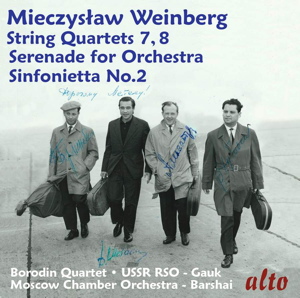
Mieczysław Weinberg (1919-1996)
Serenade for orchestra, op.47/4 (1952)
String Quartet No.7 in C major, op.59 (1957)
String Quartet No.8 in C minor, op.66 in one movement (1959)
Sinfonietta No.2, op.74 (1960)
Borodin Quartet
USSR State Radio Orchestra/Alexander Gauk
Moscow Chamber Orchestra/Rudolf Barshai
rec. 1956-1962, USSR
Alto ALC1458 [79]
Born in Warsaw, Weinberg was, with many another, buffeted and bruised by world events. From the early 1940s he had a career in the USSR. This pathway took him to acclaim and disgrace, the latter being associated with the Zhdanov Decree of 1948. After that his fortunes dived deep with a spell in gaol in 1953. Then they started to glow and then shine under the benign and, sometimes heroic, interest shown by Shostakovich, Kondrashin, Barshai, Gilels, Kogan and Rostropovich. The recordings here date from the redemptive decade just after the death of Stalin and – as it happens – of Prokofiev.
This disc is ram-jam packed with recordings which speak of Weinberg the then (1950s) contemporary composer. They offer the willing listener a witness’s vista of a composer newly finding his feet. He is also a composer (like Svetlanov the composer) ready at times to trim his sails to the prevailing ‘weather’; nothing untoward in that. The age of the recordings is not a problem. There is no hiss, or at least none I could hear, yet the treble range emerges pleasingly barbed and uncompromised.
A case in point – so far as accessibility is concerned – is the Serenade, which is in four miniature movements. These are often sweetened, optimistic and foot-tapping. For the more poetic side listen out for the undulant clarinet in the Adagio (III) but note how the composer lends the line a mildly tart and sour accent towards the end. Weinberg shows himself a brother under the skin, and at some geographical remove, from Malcolm Arnold and his many lighter works (Sinfoniettas, Serenade). The trumpet in the finale suggests Weinberg had paid heed to the example of Shostakovich the circus maitre d’ and ring-master. The gaudy brass ring out in triumph with a valedictory galop. It’s dedicated to Gauk but was in fact premiered by Rozhdestvensky with the USSRSO.
The Second Sinfonietta – almost the shortest work here – is also in four movements. The first of these seethes with something close to pin-sharp fury. The second is fast moving, whisper-quiet but always wears a lissom smile. The overbearing Adagio (III) combines downbeat oppression with beatifying prayer. In his exemplary note, Gavin Dixon hazards that the finale links the sweetly-rounded pages with a homesickness that stays just the right side of accidie. This Sinfonietta is dedicated to Barshai who premiered it with the Moscow CO in 1960.
Grave matters are given eloquent voice in the three movements of the String Quartet No. 7 (dedicated to Yuri Levitin (1912-1993)). Its preoccupations are with a sustained, determined and embittered progress. The second movement is understated like a slowly moving regretful meditation. There’s some Klezmer flavouring. It’s all rather subdued, as is the finale which smacks of nobilmente but with melancholy threaded through the interstices. This is not ingratiating music but it is satisfyingly articulated by a composer and players who exude concentration and integrity. The Quartet No. 8 is in just one movement. In this is compressed intense concentration and bursts of obsessive fairy-speed. It runs to just over half the playing time of the Seventh (25:47 cf. 15:31). Again the players are the Borodin Quartet. The early history of both these works was borne high by these players, so it is fitting that the present recordings are available. Chandos, CD Accord and CPO have given us modern recordings.
The notes, still indispensable in the case of Weinberg, are, as I have said, by Gavin Dixon. David Fanning is right to remind us that the current Weinberg boom is of only recent (the 1990s) vintage and this disc gives perspective, as does its even more compelling Alto predecessor.
Rob Barnett
Help us financially by purchasing from



















